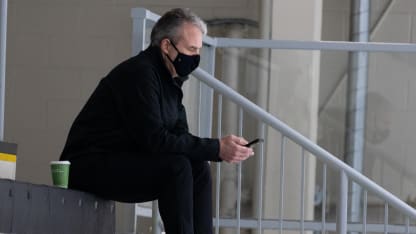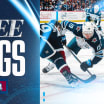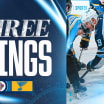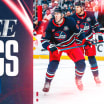Perreault cleared waivers, despite it being
a stressful 24 hours for the 33-year-old forward
. Luca Sbisa and Eric Comrie were claimed by the Nashville Predators and New Jersey Devils, respectively.
Of course, Perreault clearing waivers wasn't a sure thing.
"It's not a fun conversation, but at the same token, that's the business side of it that needed to transpire yesterday," said Cheveldayoff. "Matty was fully on board. He said 'I'll do whatever I can do to help this team to make sure we have the most flexibility as possible.'"
At the same time as those players were put on waivers, the Jets also reassigned seven players to the Manitoba Moose.
The next step involved Long Term Injured Reserve (LTIR) and the best way to maximize the salary relief pool the Jets would get. Two players would ultimately end up there - Dominic Toninato and Bryan Little.
Again, the order in which this was done was key. Toninato's cap hit of $700,000 resulted in the Jets being able to go over the $81.5 million dollar cap. Then, through cap recapture, the Jets are able to get to what Cheveldayoff calls "ground zero."
So, Toninato - who didn't pass the training camp physical and is undergoing further testing- went on LTIR. Along with reassigning Cole Perfetti, Ville Heinola, Nelson Nogier, and C.J. Suess to the Manitoba Moose, the Jets roster was now cap compliant (at $81.242 million and change, per CapFriendly) with 21 players on the active roster.
"You're able to submit a compliant roster, but you don't have any more LTI space available," said Cheveldayoff.
Next, was Little.
"The next day we invoked on Bryan Little. We go from zero to an LTIR space of $5.2 (million) and you go from there, you operate in the season after that," said Cheveldayoff. "That will be the space going forward, but it doesn't grow. What that cap space does is you can replace players or add players up and to that number."
The accomplishment is one that many teams had to navigate over the last several weeks.
"My hat goes off to Larry Simmons who does a lot of the heavy lifting on this," said Cheveldayoff. "In my past life, I had to be the guy that made sure we were within a couple bucks of the cap when I was with Chicago. There are a lot of little intricacies that go into it, but you need to have someone that understands it very well mapping out the process."
The salary relief pool will allow the Jets to sign Trevor Lewis - in camp on a professional tryout - potentially before end of day on Wednesday.
Still, the Jets aren't done yet. The whole season will require the same cap flexibility that Cheveldayoff and Simmons have shown in the final days of training camp.
Cheveldayoff anticipates a lot of players moving from the taxi squad to either the Jets roster or the Moose roster depending on schedule. This will especially become a factor when the American Hockey League commences on Feb. 5.
Even that won't be straight forward. Cheveldayoff expects the AHL to have the exact same protocol as the NHL when it comes to quarantine and testing for COVID-19.
"We'll be able to move players between the American League and the taxi squad with greater ease than if we weren't doing that testing," said Cheveldayoff. "It's going to involve air charter for our teams when they go. It's an expensive proposition in order to ensure the integrity of the protocols and to make sure out of an over-abundance of caution, that everybody is maintaining a safe environment and making sure they're not a threat to anyone in any community."
Cap and roster wizardry aside, Cheveldayoff is happy with the Jets roster he and his team have been able to construct.
"Internal expectations are obviously very high. Internal excitement is very high," said Cheveldayoff. "We're just excited and feel very fortunate that we get an opportunity to hopefully provide some level of excitement to the fans and become a distraction in what's a very difficult time."



















